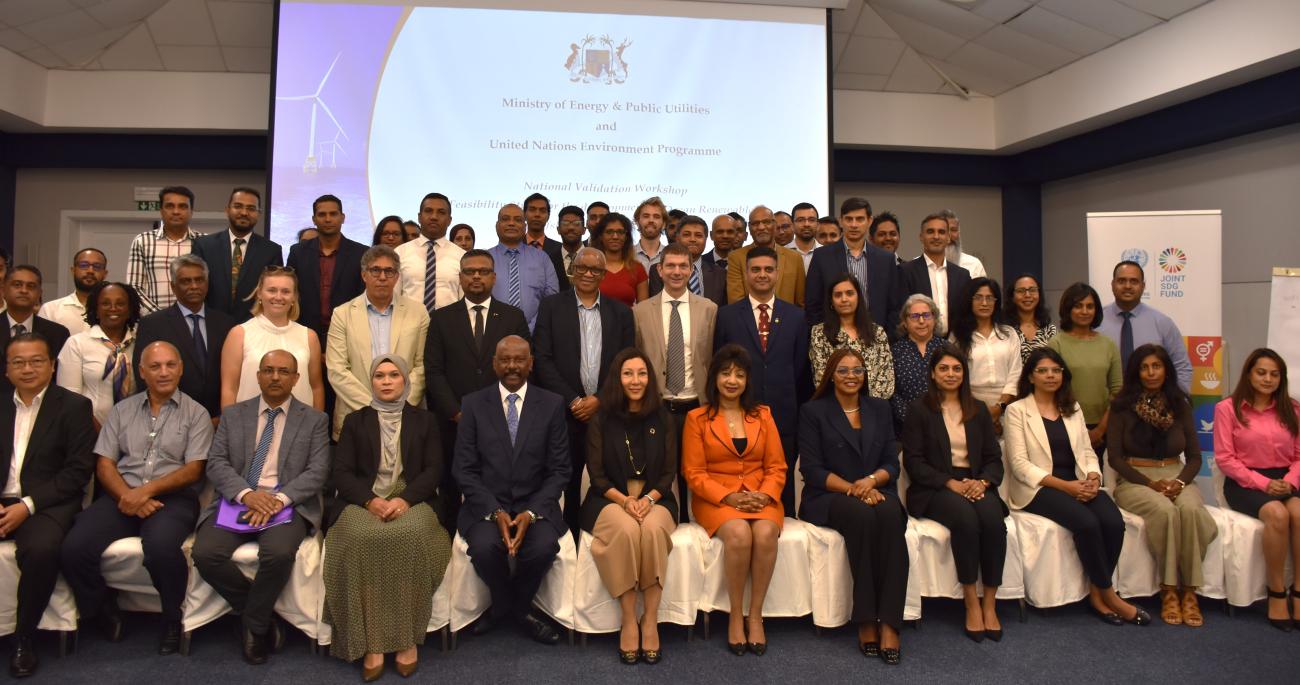Step into the realm of sustainable energy innovation with the “Prefeasibility Study on Offshore Wind Energy in Mauritius,” a groundbreaking initiative under the Joint SDG Fund Project on Blue and Green Economy in Mauritius and Seychelles.
Recently, on October 5th, 2023, a Validation Workshop was convened to illuminate the findings of this pivotal study. Organized by the United Nations Environment Programme (UNEP) in partnership with the Ministry of Energy and Public Utilities, and bolstered by the support of the United Nations Resident Coordinator Office for Mauritius and Seychelles, this full-day event heralded a new era of renewable energy exploration.
Commissioned by the Ministry of Energy and Public Utilities as part of the ongoing Joint SDG Project, this study holds the promise of revolutionizing the energy landscape of Mauritius. The workshop was inaugurated by the Honourable Georges Pierre Lesjongard, Minister of Energy and Public Utilities, and Ms. Lisa Singh, UN Resident Coordinator for Mauritius and Seychelles, setting the stage for collaborative dialogue and innovative solutions.

The Republic of Mauritius unveils its visionary Renewable Energy Roadmap 2030 for the Electricity Sector. Published in May 2022, this roadmap charts an ambitious course towards a greener, more sustainable future. In alignment with this forward-looking strategy, ocean renewables are poised to play a significant role, with a forecasted contribution of 8% to the total energy mix by 2030. This includes 6% from Offshore Wind and 2% from Wave and Tidal energy sources, catalyzing a paradigm shift in Mauritius' energy landscape.
Under the auspices of the Joint SDG Project on Blue and Green Economy in Mauritius and Seychelles, the Government of Mauritius has embarked on a comprehensive assessment of ocean renewables technology. Spearheaded by the Danish Technical University (DTU Wind), extensive consultations were conducted with stakeholders across various sectors, including energy, fisheries, shipping, tourism, and the environment.
Through a collaborative, whole-of-society approach, key sites were identified for the implementation of offshore wind farms, signaling unprecedented scaling-up opportunities. Simulations of wind potential underscored the viability of these projects, with the potential for a wind farm exceeding 50 MW in installed capacity.
However, the journey towards sustainable energy is not without its challenges. To ensure environmental and social stewardship, additional studies have been identified to mitigate adverse impacts throughout the project lifecycle, from implementation to decommissioning.
Looking ahead, the Government of Mauritius is poised to translate vision into action, with plans underway for the development of a conceptual design for an offshore wind farm of up to 100 MW. This bold step positions Mauritius on a trajectory to achieve its target of 60% renewable energy by 2030, aligning closely with the Sustainable Development Goals (SDGs) of Affordable Clean Energy (SDG 7), Climate Action (SDG 13), and Life below Water (SDG 14).
In parallel, Mauritius played host to a regional networking forum from October 4th to 6th, 2023. Organized by UNEP in collaboration with the Ministry of Environment, Solid Waste Management, and Climate Change, this forum served as a platform for stakeholders from across the SWITCH Africa Green partner countries to converge. From policymakers to business associations, financial institutions to civil society organizations, the forum fostered dialogue and collaboration towards the shared goal of advancing an inclusive green economy and circular economy.
As Mauritius charts a course towards sustainability, these initiatives underscore its unwavering commitment to fostering environmental resilience and economic prosperity for generations to come.
Note:
The Joint SDG Fund's joint programmes are under the prestige leadership of the Resident Coordinator Office and implementing United Nations Agencies. With sincere appreciation for the contributions from the European Union and Governments of Belgium, Denmark, Germany, Ireland, Italy, Luxembourg, Monaco, The Netherlands, Norway, Portugal, Republic of Korea, Saudi Arabia, Spain, Sweden, Switzerland and our private sector funding partners, for a transformative movement towards achieving the SDGs by 2030.



















